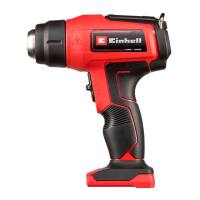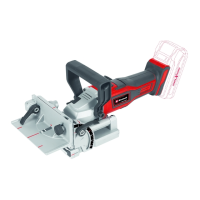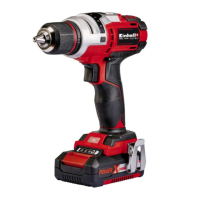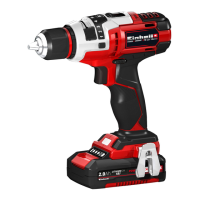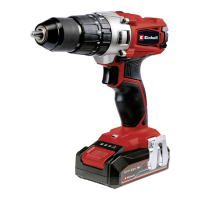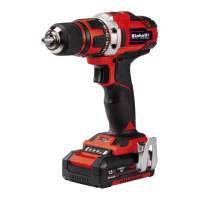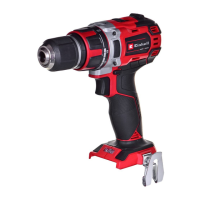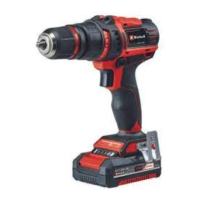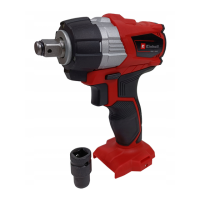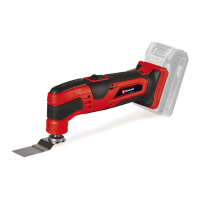EN
- 10 -
that the battery pack has already suff ered
dangerous damage (exhaustive discharge).
9. Charging batteries at a temperature below
50°F (10°C) will cause chemical damage to
the cell and may cause a fi re.
10. Do not use batteries which have heated
during the charging process, as the battery
cells may have suff ered dangerous damage.
11. Do not use batteries which have suff ered
curvature or deformation during the charging
process or which show other non-typical
symptoms (gassing, hissing, cracking,…)
12. Never fully discharge the battery pack
(recommended depth of discharge max.
80%) A complete discharge of the battery
pack will lead to premature ageing of the
battery cells.
13. Never charge the batteries unsupervised.
Protection from environmental infl uences
1. Wear suitable work clothes. Wear safety
goggles.
2. Protect your cordless tool and the battery
charger from moisture and rain. Moisture
and rain can cause dangerous cell damage.
3. Do not use the cordless tool or the battery
charger near vapors and infl ammable liquids.
4. Use the battery charger and cordless tools
only in dry conditions and an ambient
temperature of 50°F to 104°F (10°C to 40°C).
5. Do not keep the battery charger in places
where the temperature is liable to reach over
40°C. In particular, do not leave the battery
charger in a car that is parked in the sunshine.
6. Protect batteries from overheating.
Overloads, over-charging and exposure to
direct sunlight will result in overheating and
cell damage. Never charge or work with
batteries which have been overheated –
replace them immediately if possible.
7. Storage of batteries, battery chargers
and cordless tools. Store the charger and
your cordless tool only in dry places with an
ambient temperature of 50°F to 104°F (10°C
to 40°C). Store the lithium-ion rechargeable
battery in a cool and dry place at 50°F to 68°F
(10°C to 20°C). Protect them from humidity
and direct sunlight! Place only fully charged
batteries in storage (charged at least 40%).
8. Prevent the lithium-ion battery pack from
freezing. Battery packs which were stored
below 32°F (0°C) for more than 60 minutes
must be disposed of.
9. When handling batteries beware of
electrostatic charge: Electrostatic discharges
cause damage of the electronic protection
system and the battery cells. Avoid
electrostatic charging and never touch the
battery poles.
Battery Caution + Disposal
Disposal
Should your appliance need replacement after
extended use, do not dispose of it with the
household refuse, but in an environmentally safe
way.
Waste produced by electrical machine
items should not be handled like normal
household rubbish. Please recycle where
recycle facilities exist. Check with your local
authority or retailer for recycling advice.
Always dispose of your battery pack according
to federal, state, and local regulations. Contact
a recycling agency in your area for recycling
locations.
CAUTION! Even discharged battery packs
contain some energy. Before disposing, use
electrical tape to cover the terminals to prevent
the battery pack from shorting, which could cause
a fi re or explosion.
WARNING! To reduce the risk of injury or
explosion, never burn or incinerate a battery
pack even if it is damaged, dead, or completely
discharged. When burned, toxic fumes and
materials are emitted into the surrounding
atmosphere.
1. Batteries vary according to device. Consult
your manual for specifi c information.
2. Install only new batteries of the same type in
your product (where applicable).
3. Failure to insert batteries in the correct
polarity, as indicated in the battery
compartment or manual, may shorten the life
of the batteries or cause batteries to leak.
4. Do not mix old and new batteries.
5. Do not mix Alkaline, Standard (Carbon-Zinc),
or Rechargeable (Nickel Cadmium, Nickel
Metal Hydride, or Lithium-Ion) batteries.
6. Do not dispose of batteries in fi re.
7. Batteries should be recycled or disposed of
as per state and local guidelines.
When shipping or disposing of batteries and
cordless tools, always ensure that they are
packed individually in plastic bags to prevent
short circuits and fi res.
Anl_TE_JS_18_Li_SPK7_USA.indb 10Anl_TE_JS_18_Li_SPK7_USA.indb 10 12.07.2019 12:22:1612.07.2019 12:22:16
